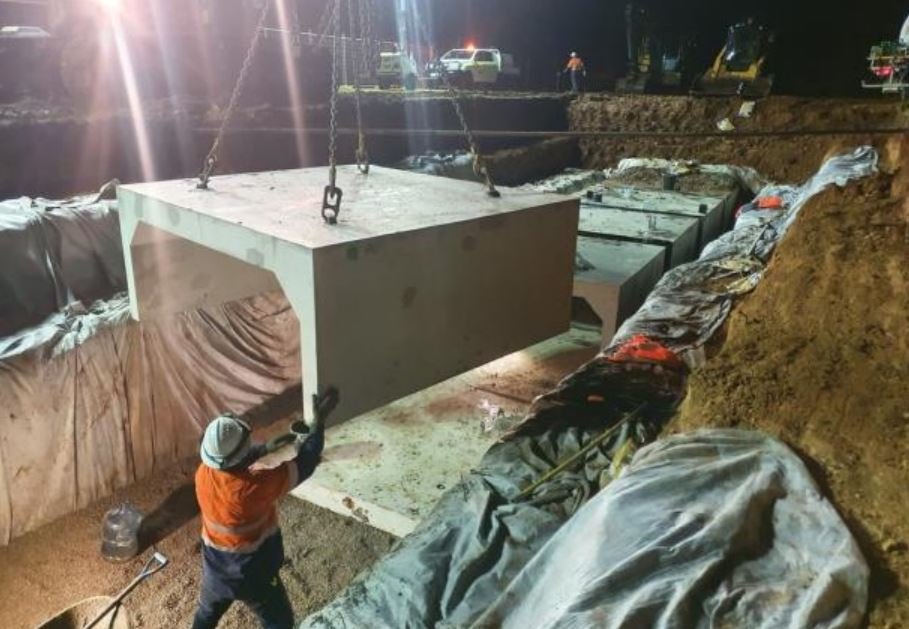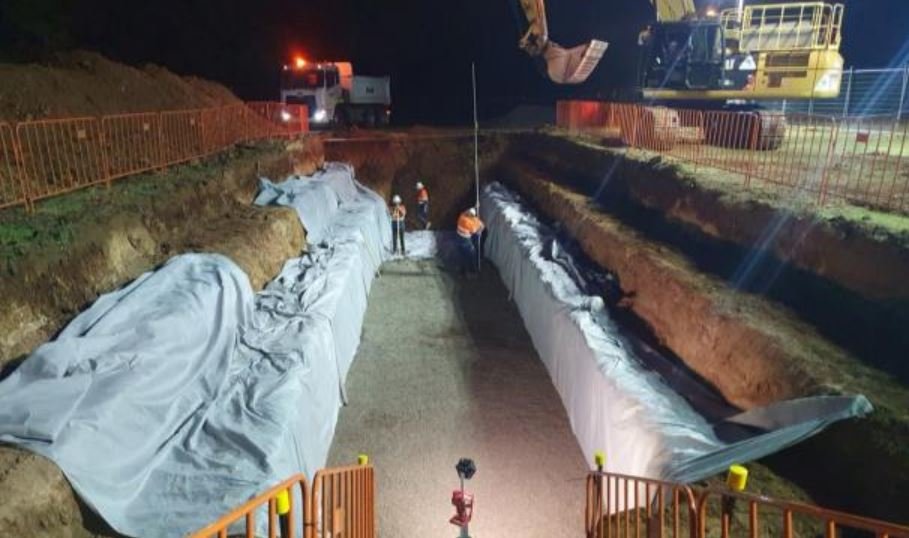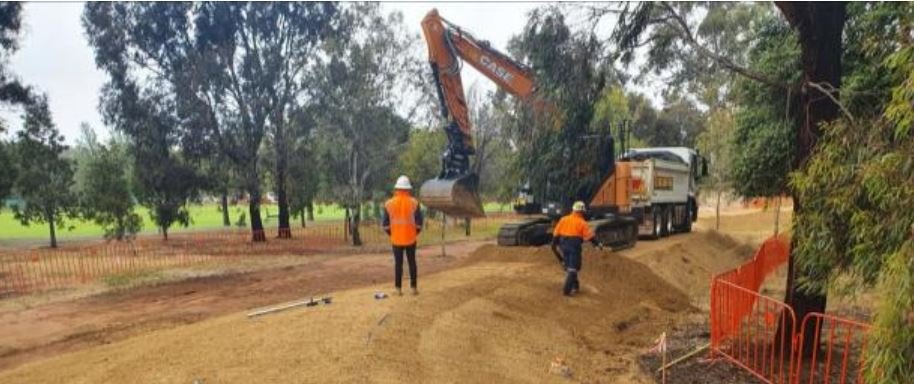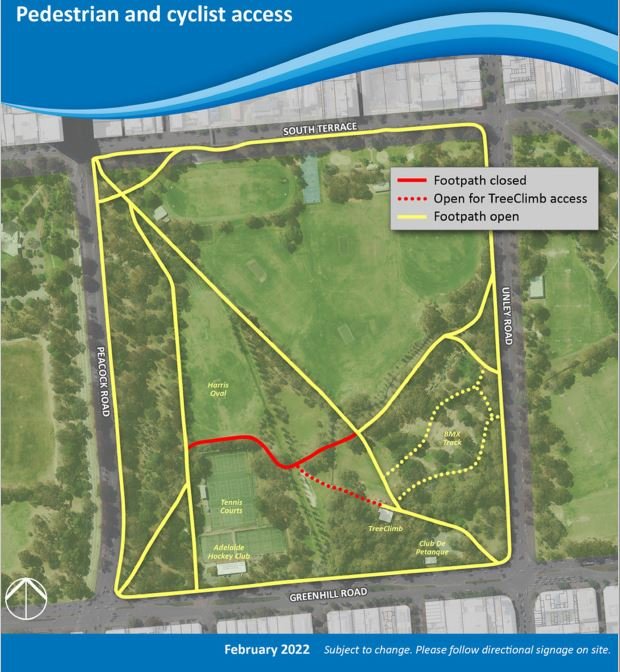by Carla Caruso
More than 12,000 new shrubs, trees and reeds are about to be planted in Blue Gum Park / Kurangga (Park 20) as part of a stormwater management project due for completion later this year.
The stormwater project is the little sibling of the much larger wetlands in the southern half of Victoria Park / Pakapakanthi (Park 16) which will be officially opened on Friday 6 May.
It’s all part of the Brown Hill Keswick Creek Stormwater Project, helping to manage flooding from the creeks and within downstream residential areas.
The works in both parks, worth $18 million in total - $12 million for Park 16 and $6 million for Park 20 - are among eight subprojects in Adelaide.
For Park 20, work began last October and is expected to be completed by August. It includes new stormwater infrastructure, extensive landscaping, and new asphalt shared-use paths.
We chatted to project director Peta Mantzarapis, (pictured), about progress to date, and concerns that two park-lovers have raised with us.
The site plan for Blue Gum Park / Kurangga (Park 20) currently under construction. Image: Brown Hill & Keswick Creeks Stormwater Board.
Hi, Peta. Please tell us why the works in Park 20 are being undertaken.
The works being delivered in Blue Gum Park / Kurangga will bring together existing creeks and will enable controlled flows to be discharged under Greenhill Road and downstream.
In the event of a flood-level rain event, water will build up and be contained behind the newly constructed low-level mound and temporarily inundate parts of Park 20 until it subsides.
We recently received a call from someone who was concerned that diverting the floodwaters might affect the long-term health of the huge gums along the former watercourse. His worry was that if floodwaters were diverted away from these old trees, they might gradually wither. Could this occur?
The health of the large gum trees that line the existing creek were a key concern when the design was being developed for these works. This section of the creek is in very poor condition and the red gums are currently vulnerable to erosion.
The works we are delivering will enable this part of the creek to be ‘abandoned’ as an open waterway and backfilled with a porous material to allow a continued low flow of water. This low flow will support the ongoing health of the trees.
Work continues in Park 20. Photo: Brown Hill & Keswick Creeks Stormwater Board.
In January, a large branch fell at the TreeClimb adventure park in Park 20, narrowly missing kids on one of the courses. Would tree health be in any way connected to the poor condition of the creek at present?
The project team meets regularly with TreeClimb as a key stakeholder to the project delivery and has been made aware of the damaged tree.
The damaged tree forms part of the TreeClimb course ‘infrastructure’, and as such, any further information regarding the arboreal assessment for this tree, including contributing factors to the recent incident, would need to be obtained from TreeClimb or the City of Adelaide.
One park-goer wrote to us (in February): “There used to be a fence of hardy wattles at the north end of the Adelaide Hockey Club. It used to smell like paradise at the end of winter and hide the fairly plain developments of the hockey club. This afternoon, it looked like this…”
We also received an email from someone (as above), lamenting the loss of wattles at the north end of the hockey club. How many trees are being removed due to the works, and what’ll replace them?
Project designers have placed particular emphasis on retaining trees and vegetation, wherever possible, and are working closely with a project arborist.
Although three regulated trees and one significant tree were approved for removal as part of the project, careful management during construction meant that the three regulated trees were able to be retained.
One significant tree and 99 additional smaller trees/larger shrubs – all unregulated or exempt – have … been removed during construction.
The wattles referred to in your email were removed to enable the construction of the stormwater containment mound and elevated shared-use pathway. In designing this section, the existing location and use of Harris Oval and the tennis courts influenced the positioning of the mound and path.
The east-west pedestrian and cycling path (marked in red) is temporarily closed during the project works. Image: Brown Hill & Keswick Creeks Stormwater Board.
Some 12,500 new plants are being propagated off-site, ready for planting during the cooler months, when they have the best chance of successful establishment. All plants are native to the local area, with some species specifically selected to vegetate the banks of the open channels.
Ninety-nine trees/larger shrubs will also be planted in and around Park 20 - including eucalyptus varieties native to the Adelaide Plains - [such as] Callitris gracillis, Eucalyptus camaldulensis, and Eucalyptus leucoxylon s.s.
Plant selection has been undertaken in consultation with a Kaurna landscape working group.
What has been achieved so far on-site and what is there still to do?
Works are currently focused on completing the construction of the new open-creek channels, commencing the backfill of redundant creeks, and construction of realigned shared-user pathways.



Images: Lifting in the culvert crown; trench excavation; trimming the edges of the containment mount.
Pics: Brownhill Keswick Creek stormwater project - Dec 2021 update.
The final stage of the project will see the installation of landscape features including fencing, garden beds and tree planting, and grassing of the new mound and areas within the project footprint … The new layout can be viewed on the concept plan.
Positioning the head wall, December 2021. Photo: Brown Hill & Keswick Creeks Stormwater Board.
Read more about this project and the related larger wetlands project in Victoria Park / Pakapakanthi (Park 16) at the project website: https://bhkcstormwater.com.au/stormwater-management-in-the-south-park-lands/.









